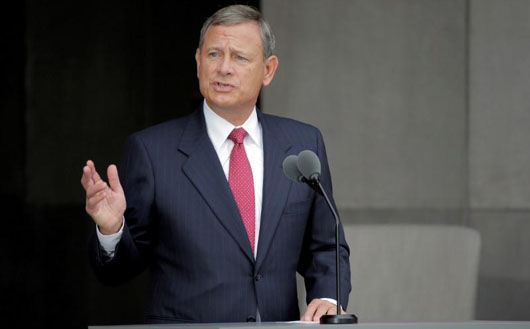by WorldTribune Staff, June 26, 2018
The U.S. Supreme Court on June 26 upheld President Donald Trump’s ban on travel from several mostly Muslim nations.
Chief Justice John Roberts wrote that presidents have substantial power to regulate immigration and rejected challengers’ claims of anti-Muslim bias.

“The text says nothing about religion,” Roberts wrote.
The policy has “a legitimate grounding in national security concerns,” and it has several moderating features, including a waiver program that would allow some people from the affected countries to enter the U.S., Roberts said. The Trump administration has said that 809 people have received waivers since the ban took full effect in December.
The 5-4 decision was the high court’s first substantive ruling on a Trump administration policy.
Trump hailed the decision as “a moment of profound vindication” following “months of hysterical commentary from the media and Democratic politicians who refuse to do what it takes to secure our border and our country.”
Democratic Rep. Keith Ellison of Minnesota, the first Muslim elected to Congress said, “This decision will someday serve as a marker of shame.” Ellison and Sen. Mazie Hirono of Hawaii, who was born in Japan, both compared the ban and the court’s ruling to the internment of Japanese-Americans during World War II.
“Seventeen months of litigation, down the tubes for the left,” columnist Cheryl K. Chumley wrote for The Washington Times.
Trump’s travel ban, Chumley noted, is not a “Muslim ban” as the Left insisted in many months of legal challenges.
“What a smackdown for Democrats,” Chumley wrote. “How can they sue their way to open borders now?”
This court’s ruling “is a clear win for Republicans – a clear vindication for Trump, whose campaign rhetoric, the high court found, had been unfairly applied to his White House border policy days,” Chumley wrote. “Apparently, and thanks to this ruling, it seems even a presidential candidate is entitled to free speech.”
The Trump policy applies to travelers from Iran, Libya, Somalia, Syria and Yemen. It also affects travelers from North Korea and some Venezuelan government officials and their families. Chad was removed from the list in April after improving “its identity-management and information sharing practices,” Trump said in a proclamation.
The administration had pointed to the Chad decision to show that the travel restrictions are premised only on national security concerns.
Subscribe to Geostrategy-Direct __________ Support Free Press Foundation
